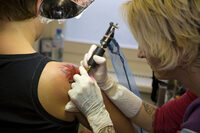
Tattoos have always been popular, but in recent years’ tattoos have become less of a taboo and moved more into the mainstream, with 1 in 5 adults in the UK having a tattoo. A study has also shown that 1 in 10 people with a tattoo experienced problems with their tattoo, including swelling, itching, infection and redness, with some people in the study’s complications from the tattoo lasting years.
Obviously, tattoos do come with quite a few risks, we have put together a list of some of the main health and safety hazards in the tattoo studio and how they should be prevented:
- Cross Contamination – Cross contamination is the spreading of germs, bacteria and/or disease by carrying them from an infected surface to a non-infected surface. Cross contamination can happen in the tattoo parlour if a tattoo artist was to place their tools on a counter that isn't disinfected. Failing to sterilise the instruments before the next procedure leaves both the customer and the artist themselves vulnerable to cross-contamination. Tattooing chairs and counters in tattoo studios should be disinfected between each customer and artists should also wear the appropriate gloves and clean reusable equipment between procedures.
- Tattoo Equipment Waste – It is a tattoo artist’s responsibility to safely dispose of used tattooing needles in the appropriate bin or container which should be emptied regularly to ensure that it does not overflow and risk somebody getting scratched by a used needle.
- Tattoo Allergy – As with any foreign substance that enters the body, tattoo ink can potentially cause an allergic reaction. Tattoo allergies can result in irritation, a rash, swelling or skin abnormalities at or around the site of the tattoo. Some colours of tattoo ink contain substances that can react badly with some people, such as iron oxide, mercury sulphide, ferric hydrate, and manganese. Red ink is known to be the most common for causing irritation. Obviously you aren’t able to predict if you are going to react badly to tattoo ink, but if you do think you may have had an allergic reaction, you should see your doctor and get a diagnosis as soon as possible to determine how serious your reaction is and what the best course of treatment will be.
If you are thinking about getting a tattoo you should always consider these risks and book into a reputable tattoo parlour that follows health and safety guidelines appropriately. If you own a tattoo studio, you should make sure you have a tattoo shop insurance policy in place.